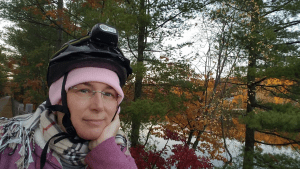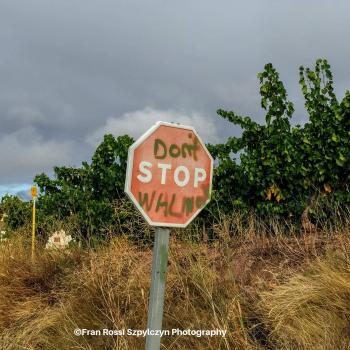This is our fifth article in our Lenten series about pilgrimage, Sick Pilgrim’s Progress. You can read week 1 here, week 2 here, week 3 here, and week 4 here.
Pilgrimages have been indispensable to faith journey. I have found much healing in my almost daily pilgrimages hiking, biking, snowshoeing and walking here in New Hampshire. Rain or shine, day and night being in the elements has helped me to process and heal from my 20 years in a highly authoritarian Catholic church where belonging hinged on “Obedience to the Magisterium” and being Republican. I would also describe it as tribal, “us and them” with a strong emphasis on who is in and who is out based on certain boundary markers. Pilgrimages help me to re-examine what church and healthy authority looks and acts like. Through them I have found rest and wholeness and the awareness that God is deeper and wider than I ever imagined.
When my children were younger we used to go geocaching. By using a GPS we would look for “caches” planted in many different places. Some would be multi-step journeys with waypoints that we had to find to get to the next point. Having a GPS was essential to finding our way. In a different sense, we all need waypoints and a properly functioning internal GPS for growth and change and wholeness in our faith journeys.
I entered adult life, motherhood and my church community with a miscalibrated GPS. In my dysfunctional family, I learned to maintain silence when I disagreed to gain approval, belonging and safety. My family and I were a part of an intensive catechesis program. The goal was to give us a “well-formed conscience”. We were taught that agreeing on a checklist of doctrines was essential. Some of those included: contraception was intrinsically evil, no female ordination, LGBTQ individuals were called to lifelong celibacy. A well-formed conscience depended on conformity and unwavering obedience to authority. The answers to all questions were already decided. This was not healthy conscience formation.
Now I understand more clearly that areas of theology in the church, particularly ones around sex, obedience and authority, exist as self-preservation for an institution and refuse to incorporate what we have learned in the social and biological sciences in the last 50 years. The church has failed to update its operating system. Theological miscalibrations hurt people.
I can see the landscape more clearly now almost a decade after we left. I’d like to share with you some useful waypoints from the journey. Perhaps they can help guide you.
Waypoint #1: An unhealthy church home can impact your physical and mental health
Physical, mental and spiritual wellbeing are all inter-connected. Be in spaces inside and outside of church that understand this. Unhealthy theology devastated my physical and mental health and caused unnecessary suffering for years. Learning about neuroscience and religious trauma has been essential for healing. Understanding how threats of hell, calls to absolute obedience, and how theology around sacrifice and suffering is manipulated to serve the egos of those in authority is a huge part of this waypoint. I experience a wholeness now that I never knew existed. Jesus calls this the peace that surpasses all understanding.
Waypoint #2: Know your childhood conditioning and the roles you play.
I operated in the church like I did in my childhood. I deferred and did what I needed to do to conform to maintain my sense of belonging and safety. Today, I supplement my daily pilgrimages with connection to many tools and friends that help me understand many things including attachment theory, neuroscience, the Enneagram and restorative yoga. I have also learned how to spot coercive control in relationships and churches. All of these help me to identify and change the parts of me that need healing. It is important that I don’t carry my unhealthy patterns forward.
Waypoint #3: Be in a community where you can speak out loud about what you think and observe. The people you receive feedback from should not be using minimizing, denial, gaslighting and invalidation, or threats of hell.
No matter how hard you try to enlighten people who need theology to fit into a box to maintain their sense of belonging, certainty and control, they will not be able to hear you. Raising questions that involve thinking outside of the box will challenge one’s sense of belonging. Deconstructing and rebuilding our theological frameworks in is an enormous undertaking, especially if our identity is built around them.
This was a hard way point for me to get past because I spent too much time trying to discourse with people who modeled the gaslighting, minimizing and denial of my childhood. It was a familiar but unhealthy way of existing.
Tip #1: avoid Catholic forums that are “Obedient to the Magisterium” as these are epicenters of gaslighting and minimizing. I was banned from Catholic Answers forums for suggesting that couples could use their conscience when deciding methods of family planning because, as many of us know, NFP is not a usable method for all couples.
Tip #2 Use unfriend, unfollow and block on Facebook as tools for your mental health. This one paid off for me during the 2016 and 2020 elections as Trump was “the Catholic vote” at my former parish. Facebook should be a healing and life giving space.
Tip #3 My daily pilgrimages where I move, pray and breath provide space for healing and redirect my focus. Now I look for the helpers and the healers and find them in abundance.
If my journey resonates with you, know that you are not alone. Connect yourself to people who have a functioning GPS, know the terrain and can help your find your own waypoints. It is hard work to leave a church and rebuild your faith and community. My experience of God exists on a wider and deeper landscape now. My capacity to love is increased. I breathe a sigh of relief with gratitude for the God in who I live and move and have my being (Acts 17:28)














